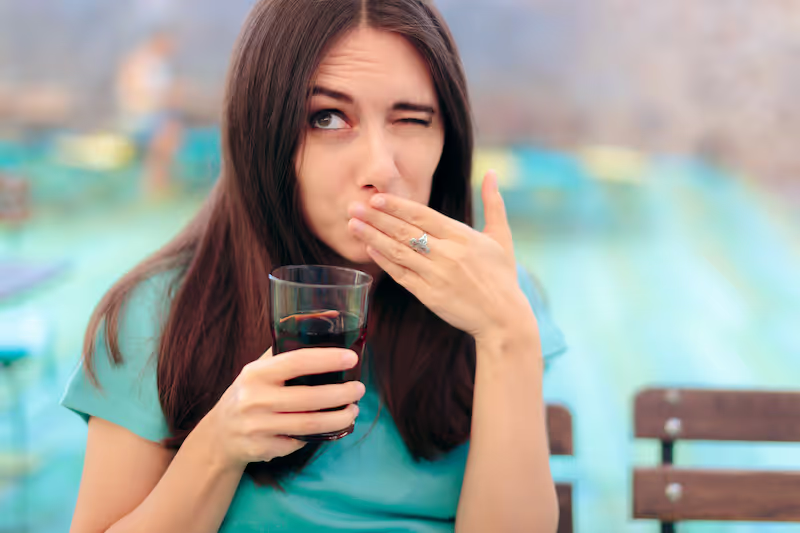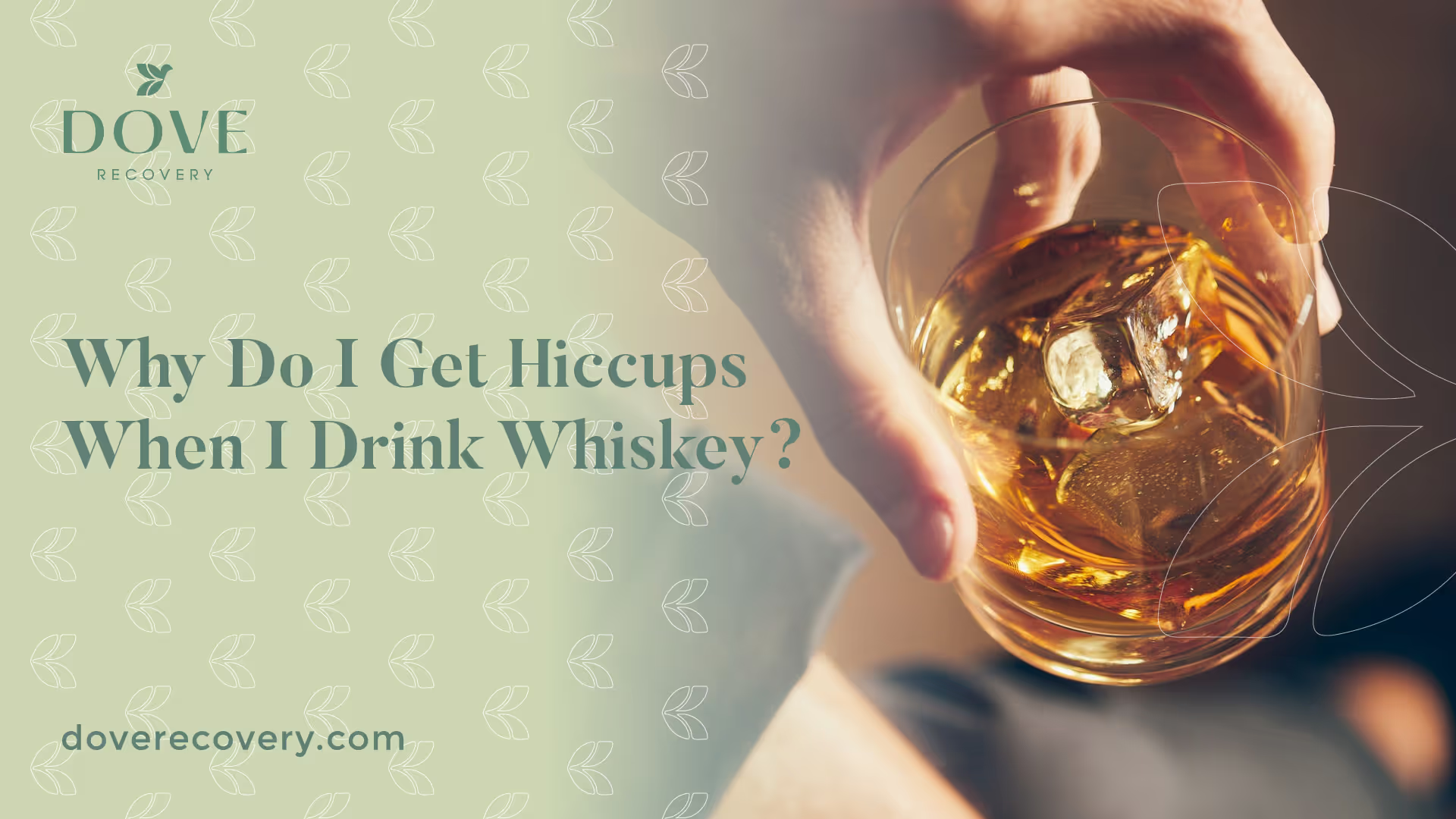Why Do I Get Hiccups When I Drink Whiskey?


Have you ever found yourself enjoying a glass of whiskey only to suddenly be hit with a case of the hiccups? It's a frustrating experience, to say the least, but have you ever wondered why this happens? In this article, we'll explore the science behind why we get hiccups when we drink whiskey.
What are Hiccups?
Before diving into the whiskey hiccup phenomenon, let's start by understanding what hiccups are. Hiccups, also known as singultus, are a common and often harmless condition that affect people of all ages. They are involuntary contractions of the diaphragm muscle, which is the muscle that separates the chest cavity from the abdominal cavity.
Although hiccups are usually brief and harmless, they can be quite annoying and even painful in some cases. There are many potential causes of hiccups, including eating too quickly, drinking carbonated beverages, and even stress or excitement.
So, what exactly is the whiskey hiccup phenomenon? Well, as the name suggests, it refers to hiccups that are specifically triggered by drinking whiskey. Some people are more prone to experiencing hiccups after drinking whiskey than others, and the exact reason for this is not yet fully understood. However, it is thought that the high alcohol content of whiskey may be a contributing factor.
Why Do We Get Hiccups?
While the exact cause of hiccups is still unknown, there are several factors that can trigger them. Some studies suggest that emotional stress and excitement can also play a role in the development of hiccups. Additionally, some medications and medical conditions have been linked to hiccups.
Eating too quickly or consuming carbonated beverages can irritate the diaphragm, which is a muscle that separates the chest cavity from the abdominal cavity and is responsible for breathing. Sudden changes in temperature can also stimulate the nerves that control the diaphragm, leading to hiccups.
In the case of drinking whiskey, it's believed that the high alcohol content could be the culprit. Alcohol is known to irritate the lining of the stomach and esophagus, and this irritation can lead to spasms in the diaphragm muscle, which in turn causes hiccups. It's important to note, however, that hiccups caused by drinking whiskey are usually temporary and will go away on their own.
How Does Whiskey Cause Hiccups?
Drinking alcohol can be a fun and social activity, but did you know that it can also cause hiccups? Yes, you heard it right! Alcohol irritates the esophagus and stomach lining, which stimulates the vagus nerve and causes the diaphragm muscle to contract involuntarily. And as we all know, this contraction is what causes hiccups.
Interestingly, some people may be more sensitive to hiccups when drinking whiskey due to their individual sensitivity to alcohol. This is because whiskey, like other alcoholic beverages, contains ethanol, which is a known hiccups trigger.
So, the next time you find yourself hiccuping after a fun night of drinking, you know what's causing it. Remember to drink in moderation and stay hydrated to avoid the unpleasant hiccuping experience. Cheers to responsible drinking!
How Can You Prevent Whiskey Hiccups?
Hiccups can be an unwelcome side effect of drinking whiskey, but there are some measures you can take to minimize your chances of experiencing them. While there is no guaranteed way to prevent hiccups altogether, the following tips may help:
- Sip your whiskey slowly and take small sips. This can help your body process the alcohol more gradually, which may reduce the risk of hiccups.
- Avoid drinking whiskey on an empty stomach. Alcohol can irritate the lining of your stomach and esophagus, which can trigger hiccups. Eating a meal or snack before drinking may help reduce this irritation.
- Consider mixing your whiskey with water or a non-carbonated beverage. This can dilute the alcohol content and reduce the irritation to your digestive system.
- Take breaks between drinks. Giving your body time to metabolize the alcohol can help prevent hiccups and other unwanted side effects.
- Stay hydrated. Drinking water throughout the evening can help keep you hydrated and lessen the chances of getting hiccups or feeling ill.
Tips for Preventing Hiccups in General
Hiccups can be an annoying and uncomfortable experience, but there are several tips you can follow to help prevent them from happening in the first place:
Eat slowly and avoid overeating
Swallowing air while eating too quickly or consuming large amounts of food can irritate your diaphragm and trigger hiccups. For example, taking smaller bites, chewing your food thoroughly, and putting down your fork between bites can all help slow down your eating pace.
Avoid consuming spicy or greasy foods
These types of foods can cause acid reflux, which can irritate the nerves that control the diaphragm and lead to hiccups. For example, you may want to avoid eating hot peppers or fried foods if you're prone to getting hiccups.
Manage stress and anxiety
Stress and anxiety have been linked to the development of hiccups, as they can lead to rapid breathing and changes in heart rate. Practicing relaxation techniques such as deep breathing exercises, meditation, or yoga may help reduce stress and lower the risk of developing hiccups.
Be mindful of your beverage choices
Carbonated beverages and alcohol are known triggers for hiccups in some people. For example, if you frequently get hiccups after drinking soda or beer, you may want to try switching to water or another non-carbonated beverage.
Stay hydrated throughout the day
Drinking enough water can help keep your body functioning properly and reduce the risk of developing hiccups. Aim to drink at least eight glasses of water per day, or more if you're physically active or live in a hot climate.
By following these tips and making simple changes to your diet and lifestyle habits, you may be able to prevent hiccups and enjoy a more comfortable, hiccup-free life.
How to Treat Persistent Hiccups After Drinking Whiskey
While most whiskey hiccups are temporary and go away on their own, some people may experience persistent hiccups that can last for hours or even days. If you're one of these unlucky souls, there are a few things you can try to help alleviate your symptoms:
1. Breathe into a paper bag
Breathing in and out of a paper bag can help increase the level of carbon dioxide in your bloodstream, which may help relax the diaphragm muscle and stop hiccups.
2. Drink water or other non-carbonated beverages
Staying hydrated is important when dealing with persistent hiccups. Drinking water or other non-carbonated beverages can help soothe irritation in your digestive system and reduce spasms in the diaphragm muscle.
3. Try holding your breath
Holding your breath for several seconds at a time may help interrupt the cycle of hiccups and stop them from continuing.
4. Massage the carotid artery
Gently massaging the carotid artery on one side of your neck may help stimulate the vagus nerve, which controls the diaphragm muscle.
5. Consider medication
In some cases, medication may be necessary to treat persistent hiccups after drinking whiskey. Your doctor may prescribe medications such as chlorpromazine or baclofen, which work by relaxing the muscles involved in hiccuping.
If you're experiencing persistent hiccups after drinking whiskey, it's important to consult with your doctor to rule out any underlying medical conditions that could be causing your symptoms. With proper treatment and management, you can get relief from this frustrating condition and enjoy your favorite whiskey without fear of hiccuping all night long!
Other Types of Alcohol That May Trigger Hiccups
While whiskey is often blamed for causing hiccups, other types of alcohol can also trigger this frustrating condition. Here are some factors that can contribute to alcohol-induced hiccups:
Ethanol
All forms of alcohol contain ethanol, which is a known irritant to the digestive system. When consumed in large quantities or too quickly, ethanol can cause inflammation and irritation in the esophagus and stomach lining. This irritation can then stimulate the vagus nerve, which controls the diaphragm muscle and leads to hiccups. For example, you may be more likely to get hiccups after drinking a lot of wine or beer in a short period of time.
Sensitivity to certain types of alcohol
Some people may be more sensitive to certain types of alcohol than others. For example, some individuals may experience hiccups after drinking beer or wine but not have any issues with hard liquor, while others may experience the opposite. If you're someone who frequently gets hiccups after drinking alcohol, it may be worth experimenting with different types of beverages to see if there are certain ones that trigger your symptoms less frequently.
Carbonation
Carbonated alcoholic beverages such as champagne or beer are more likely to trigger hiccups than non-carbonated drinks due to their higher levels of carbon dioxide gas. This gas can irritate the diaphragm muscle and lead to spasms that cause hiccups.
How Long Do Drunk Hiccups Last?
Hiccups are a common and often harmless condition that can occur after drinking alcohol. While they can be annoying and even painful, the good news is that drunk hiccups are usually temporary and will go away on their own. However, the duration of drunk hiccups can vary from person to person, and may depend on factors such as:
- The amount of alcohol consumed: Drinking large amounts of alcohol can irritate the diaphragm muscle and increase the likelihood of getting hiccups.
- Sensitivity to alcohol: Some individuals may be more sensitive to alcohol than others, which can increase their risk of getting hiccups.
- Underlying medical conditions: Certain medical conditions, such as gastroesophageal reflux disease (GERD) or neurological disorders, can increase the likelihood of getting hiccups.
Natural Remedies for Treating Hiccups
If you're looking for a natural way to stop hiccups, there are several remedies you can try that may help:
Holding your breath
One of the most common and effective ways to stop hiccups is by holding your breath. This technique works by increasing the amount of carbon dioxide in your bloodstream, which can help relax the diaphragm muscle and stop the hiccups.
To do this, take a deep breath and hold it for as long as you can. Then, exhale slowly and repeat this process several times until the hiccups subside.
Drinking water
Drinking water is another simple yet effective way to stop hiccups. This method works by stimulating the nerves responsible for controlling the diaphragm muscle.
To use this remedy, simply drink a glass of water quickly without taking any breaks between sips. Alternatively, you can also try drinking from the opposite side of the glass or using a straw to drink upside down.
Gargling with ice-cold water
Gargling with ice-cold water is another natural remedy that may help stop hiccups. This method works by interrupting the nerve signals that control the diaphragm muscle.
To use this remedy, take a small sip of ice-cold water and hold it in your mouth for a few seconds before gargling it at the back of your throat. Repeat this process several times until the hiccups subside.
Using pressure points
There are several pressure points on your body that may help alleviate hiccups when stimulated. One such point is located on your upper lip, just below your nose.
To use this remedy, apply gentle pressure to this point with your finger for several seconds. You can also try pressing on other pressure points such as those located behind your ears or on the underside of your wrist.
By trying these natural remedies, you may be able to stop hiccups quickly and easily without the need for medication or medical intervention.
Takeaway
In summary, hiccups are an involuntary contraction of the diaphragm muscle that can be triggered by a variety of factors, including drinking whiskey. While there is no guaranteed way to prevent hiccups, taking your time while drinking and mixing your whiskey with other liquids may help reduce your chances of experiencing them.
Sources:
- https://www.medicalnewstoday.com/articles/312696#what-are-hiccups
- https://www.healthline.com/health/hiccup-remedies#prevention
- https://www.scientificamerican.com/article/what-causes-hiccups/
